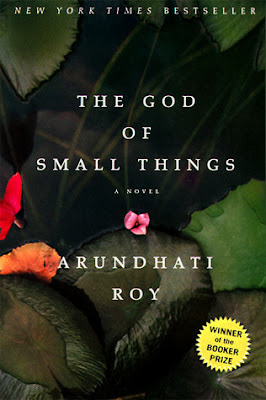 The God of Small Things
by
Arundhati Roy
The God of Small Things
by
Arundhati RoyMy rating: 5 of 5 stars
God of Small Things is my new favorite. I do not recall having been moved this much by anything I read in the recent times.
It is story par excellence. Even days after turning over the last page, the reader simply resides in the world created by Roy. The world where Estha, Rahel, Ammu, Velutha, Sophie Mol, Baby Kochamma, Mammachi and Chacho live. In the world of Ayememon, that small town in Kerala where the god of small things reigns, but is meant to be quiet. And where it is the big things that are forced upon people.
The world of God of Small Things, is a world of chaos. It is a world of patriarchal norms and how they have controlled the societies, of political quests and how they affect the lay gentry, of social differentiation and how derogatory they can be. It is a family saga set against the back drop of rural India, in a time when events were taking place at a quick pace. It is a tale of forbidden love and how it prospers in the hearts of two for whom the big things do not matter. It is the story of two twins whose lives change forever on a fateful day when everything seems right but nothing is.
But it is also a tragedy. A tale of lost dreams and torn hopes. Of the immense power of circumstances and what they can do to us. Of how perishable human tenderness is when confronted with something not aligning with past rules. It is a tale of the bittersweet romance between Ammu and Velutha. The reader finds their actions uncanny, yet cannot help falling in love with them. What brings them together is what brings others apart. Ammu's history does asks for a emphatic viewpoint. Her seeming quiet acceptance of everyone's reproaches is the outer foliage hiding the sharp currents of passion behind. It is understandable that with what she has been through she turns towards the lovable figure who comes to their house one day. Seeing her children playing with him and then giving a quick covert glance at him, the thoughts that cross her mind are only natural. And Velutha, we have come to love him a bit early enough, haven't we? The fierce storms that are visible in his eyes make him all the more likeable. He is kind, he is funny and he is tough. That he should not be literate enough, intelligent enough and be only a physical labourer, make his contrasting personality even more appealing. He belongs to a caste who are untouchables. Those who have been denied simple human rights for so long that the very thought of questioning the authority appears sinful to some. The stark inhuman manner in which Velutha's father sits in front of his house with an axe in his hand, to cut to pieces his eldest son, brings a surge of emotions for the revolting experiences he must have gone through to have become so insensitive. The juxtaposition of characters, their lives, space and time cannot have been better.
And somewhat separate from this and yet with characteristically interwoven lives are the twins of the present. They had, all that they had, taken from them. The catastrophe been great enough to numb the vocal cords of one and create a kind of blankness in the other's eyes. They have grown but only in the body and mind. Their hearts, they are still trapped in the perpetual cycle of one fateful night. Everything after that is a bit dazed recognition. The continued agonizing remnant of things left unfinished. They find solace in each other, trying to live the years that were lost. Still redefining the boundaries that can and cannot be crossed. Of what is acceptable and what is not. On similar lines as their mother did all those years before. A faint hinting that love thrives despite the difficulties.
I won't say much else and let you judge for yourself. Go grab the book and give it a read. You would be moved. Roy has created a masterpiece that calls for a connection with the heart within us. Like Estha Mon and Rahel Mol, we are the ones who get trapped inside the happenings of a single day.
Comments
Post a Comment